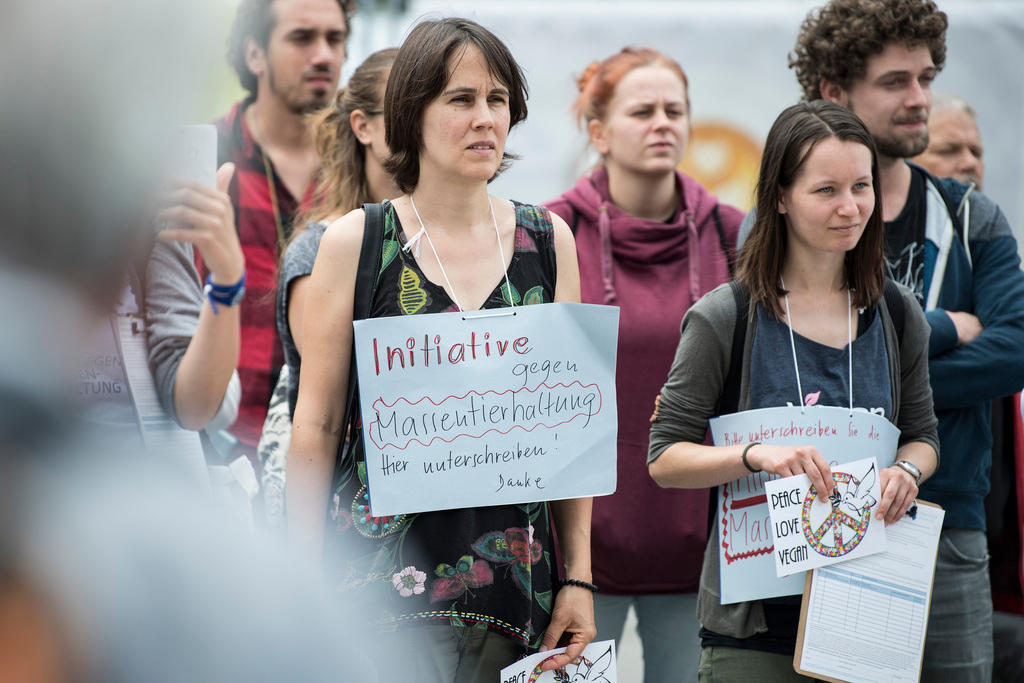Initiatives are not key to election victory
People’s initiatives are one of the tools used by parties during Swiss election campaigns to rally voters to their cause. But their mobilising potential is limited.

Christian Democrats and Social Democrats are trying to jump-start their 2019 parliamentary election campaigns with people’s initiatives, both focusing on the country’s healthcare system, up to now a theme rather neglected by politicians.
Recent opinion polls have shown that the main concern among the public is how the galloping costs of healthcare in the country can be reined in.
Claude Longchamp is one of Switzerland’s most experienced and highly-regarded political scientists and analysts.
He founded the polling and research institute GfS BernExternal link which he headed until his retirement. Longchamp has analysed and commented on votes and elections on SRF public Swiss television for 30 years.
Longchamp, a historian and political scientist, also runs the German-language blog ZoonpoliticonExternal link.
This text is part of #DearDemocracy, a platform on direct democracy issues, by swissinfo.ch. Contributors, including outside authors, frequently share their views. The opinions expressed here are not necessarily those of swissinfo.ch.
The centrist Christian Democrats are arguing for a cost ceiling. If costs are rising faster than wages, they say, the Swiss government has to intervene. The party believes that hundreds of millions could be saved in the healthcare system without a loss of quality.
For its part, the Social Democratic Party wants the financial burden to be shared out in a new way. No household, they say, should have to pay more than 10% of its budget on health insurance premiums. When that situation comes about, people should be entitled to financial aid from the government.
Other initiatives are also gathering steam, put forward by parties or party members, but organised by multi-party committees. Among these are
- an initiative that proposes to prevent the Swiss government easing rules for exporting arms to conflict-ridden states
- an anti-global warming initiative aimed at reducing CO2 emissions to net zero by 2050
- a ‘transparency’ initiative, that would require election and vote campaign committees to reveal all large donations they receive.
If a party relies on initiatives in an election campaign, such as is happening in Switzerland right now, analysts speak about their “mobilising function”.
A well-thought-out demand linked to a public issue should generate plenty of media attention, so that reaching citizens on the street becomes easier. This should then mean more votes on election day, the logic goes.
Road to election victory?
But that an initiative guarantees victory at election time is something I regard as a myth.
The last time it actually worked was in 2007. On August 1 of that year, the Swiss National Day, the right-wing People’s Party launched an initiative that proposed the automatic deportation of foreigners convicted of criminal offences.
The issue really took off, and the necessary signatures were gathered in a very short period of time.
And since a people’s initiative has to be put to a national vote within four years, the People’s Party was able to campaign permanently on this issue for the whole legislative session (2007-2011). They got the nationwide vote they wanted before the next parliamentary election, and the initiative passed in 2010 despite strong opposition.
This success the People’s Party enjoyed in 2007 prompted a similar wave of people’s initiatives in the lead-up to the 2011 election.
More than 20 projects were announced. Not all of them made it, of course, but the government administration was kept busy throughout the legislative session leading up to 2015 dealing with the mountain of initiatives.
Some also began to level criticism at the parties that they and the lobby groups associated with them were abusing the system.
Sober second look at ‘mobilising potential’
This criticism of the political parties was superfluous, as it turned out, because the attempts to copy the magic formula the People’s Party had found for a successful people’s initiative in an election year failed disastrously in 2015.
The Christian Democrats and Liberal Greens had each launched a people’s initiative in such a way that they were due to be voted on in an election year; both, however, turned out to be non-starters.
The Christian Democratic proposal for tax breaks for families did not even get a quarter of votes, and the Liberal Greens with their environment-friendly tax proposal ended up being rejected by 92% – an all-time record.
Both centrist parties were handicapped by this poor start to the election year. And the Liberal Greens, who had previously been spoiled by success, were smarting after their electoral defeat.
At present, the party leaderships are a lot more careful about using people’s initiatives as part of an election campaign. Rather, party strategists now try to manage their timing to avoid having a vote scheduled in an election year.
In 2019, all succeeded in this except for the Young Greens. If their rather poor result in the February vote aimed at curbing urban sprawl did not harm them too much, it is because the climate change issue is now front and centre.
The other parties now clearly prefer to have their initiatives voted on well ahead of elections – including the People’s Party. Their ‘Swiss law first’ initiative was put to a vote in 2018. It went down to a heavier defeat than they had expected, and left the party unsettled going into the election year.
Steering clear of election year
A different story again is the initiative to abolish free movement of people with the European Union, which People’s Party strongman Christoph Blocher has announced as his last battle.
Switzerland will most probably vote on that in 2020. The launch of the initiative was delayed long enough to make a vote in the 2019 election year unlikely.
One can be sceptical about these party tactics.

More
The decade of ballot box upsets is over
The Christian Democrats seem to be having some trouble getting enough signatures for their healthcare cost-control initiative, and they have had to hire paid campaign workers to give them a dig-out.
For its part, the Social Democratic Party is saying nothing for the moment about how its healthcare initiative is coming along.
This all makes even more sense when we reflect that in the current legislative session all 14 people’s initiatives that went to a nationwide ballot were turned down by the voters.
Other functions more important
Political scientists have been noticing all of this. Long-term studies of how people’s initiatives work say that their mobilising function is much lower than what we tend to hear in the media.
The scholarly analyses focus rather on two other functions.
One is agenda setting – that is, placing new issues in the public debate, and enlarging the debate with new options.
And a further, more important function of the people’s initiative is as a bargaining chip: interest groups can put pressure on parliament to discuss their issues.
In my view it is best to view this notion of people’s initiatives as a mobilising tool in the election campaign with the autumnal coolness that is sure to set in by October 20, when the election results are known.
I would want to warn political parties against unrealistic expectations of that sort; I would also warn critics of the parties against ascribing equally unrealistic powers to this fascinating tool of democracy.

More
What’s a people’s or citizens’ initiative?
Adapted from German by Terence MacNamee/urs

In compliance with the JTI standards
More: SWI swissinfo.ch certified by the Journalism Trust Initiative













You can find an overview of ongoing debates with our journalists here . Please join us!
If you want to start a conversation about a topic raised in this article or want to report factual errors, email us at english@swissinfo.ch.